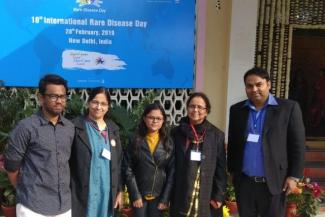
Mr Manjit Singh, President Lysosomal Storage Disorders Support Society, shares some salient points about the rare disease and about the activities of the organisation, LSDSS.
The LSDSS is a national level society with more than 400 patients as members who are represented by elected parents as office bearers, across India. The sole motive of the organisation is to spread awareness about this rare disease as also to help each other in availing of the best facilities available.
What are Lysosomal Storage Disorders? Can they be treated?
Lysosomal Storage Disorders are rare and genetic disorders . LSDs are a group of approximately 50 rare inherited metabolic disorders that result from defects in lysosomal function. Lysosomal Storage Diseases affect when the lysosome -- a specific organelle in the body's cells --malfunctions. LSDs are caused by lysosomal dysfunction usually as a consequence of deficiency of a single enzyme required for the metabolism of lipids, glycoproteins (sugar containing proteins) also called Mucopolysaccharides.
Like other genetic diseases, individuals inherit LSDs from their parents. Although each disorder results from different gene mutations that translate into a deficiency in enzyme activity, these share a common biochemical characteristic- all Lysosomal Disorders originate from an abnormal accumulation of substances inside the Lysosome. This results in severe debilitating medical complications in the form of developmental delay, movement disorders, seizures, enlarged liver, enlarged spleen, bone crises, pulmonary and cardiac problems.
Regarding treatment, out of 50 odd such disorders 7 have a definitive treatment available by way of Enzyme Replacement Therapy drugs which are infused intravenously weekly or biweekly. An oral pill drug is also available for one such disorder.
What are some of the common issues faced by families of persons with Lysosomal Storage Disorder, especially in an Indian context?
In the absence of timely treatment, parents face mild to severe debilitating medical complications in the form of developmental delay, movement disorders, seizures, enlarged liver, enlarged spleen, bone crises, pulmonary and cardiac problems according to the progression of prognosis of every patient.
The patient and the parent have to live through life with this disorder as it is a life long disease to be treated life long.
The general perception on rare disease challenges is that it is about finding a cure. What are the India specific challenges from an affordabilty perspective?
Researchers and physicians are working tirelessly to find a definitive cure - even a one time cure in the form of gene editing and gene therapy which will take its own time. However, the cost of drugs are prohibitively high and range from Rs.45 lacs to Rs.4 crores per patient per annum. The dose is increased according to the weight of the patient.
The Government of India has no provision to provide the treatment cost. LSDSS and its patients got National Rare Disease Policy made in the year 2018 through the intervention of Judiciary and got a Corpus of Rs. 100 crores carved out but the Government has backed out in December 2018 and kept the policy in abeyance to reformulate it leaving a couple of hundred patients in the lurch and to maybe even die in the absence of timely treatment.
Do persons with rare diseases need a lot of rehabilitation and nursing care as well?
Yes besides this rare genetic condition and in the absence of timely ERT treatment, patients require symptomatic and supportive palliative care all the time due to progressive damage to different organs of the body.
What is LSDSS doing to support families dealing with these issues?
LSDSS has been around since 2006 and formally since 2010, from the day of its inception, creating awareness about the LSDs, their prevention and has been trying to rope in various stakeholders to bring in the treatment options for LSD patients in India.LSDSS holds medical workshops, media workshops, round table meets across the country, and LSDSS has also been organising International Rare Disease Day every year on the last day of February since 2010 besides observing Disease specific days like Gaucher Day, MPD Day, Pompe Day and Fabry Day every year. Since last year, LSDSS has even started educating the young doctors project on LSDs. Under this umbrella, LSDSS organised Medical Workshops at State Levels at Uttar Pradesh and Uttarakhand inviting Government Doctors from 70 Districts and 20 Districts respectively. With this effort, around 230 LSDs patients are getting ERT medicine in India under various projects, through public sector undertakings, and with the ESI and Armed forces reimbursing.
What is your agenda this year? Are you doing anything around this year's theme of 'Bridging Health and Social Care'?
LSDSS is focusing on early implementation of Rare Disease Policy by the Government in true letter and spirit. It is also concentrating on the creation and the allocation of Rs. 100 crore fund to initiate the treatment to wait listed patients, on the prevention of such disorders by asking all governments in all states of India to have Compulsory Genetic Counselling and Testing of all conceiving mothers to prevent the defective births.
Do share with us some of your future plans.
We are working with international pharmaceuticals working on LSDs to come to India and work with the government to bring down the cost of treatment. We are also encouraging and urging the government to speed up the research of LSDs and set up its own units in association with ICMR, Department of Biotechnology, CSIR etc. to manufacture Generic Biosimilars.






